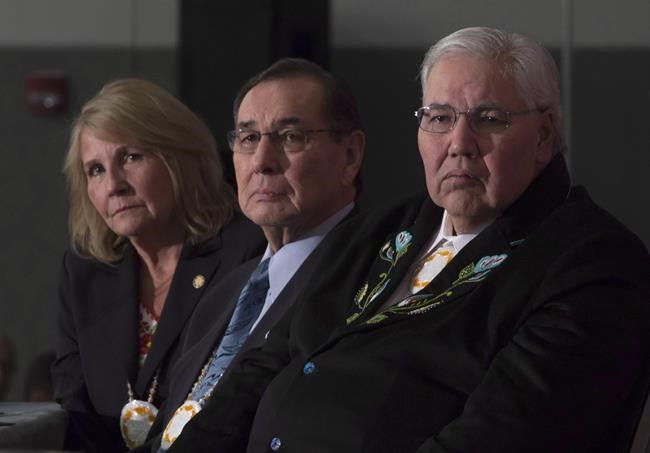TORONTO ŌĆö An Indigenous-led think tank says progress is moving at a ŌĆ£glacial pace" seven years after the final report from the Truth and Reconciliation Commission was released.
The Yellowhead Institute, based at Toronto Metropolitan University, said two of the report's 94 calls to action were completed this year ŌĆö bringing the total of completed calls so far to 13.
The group says at this rate it will take 42 years, or until 2065, to complete all the calls to action.┬Ā
ŌĆ£WeŌĆÖve been tracking the calls to action for quite a few years now and continue to be shocked by the glacial pace of sa╣·╝╩┤½├ĮŌĆÖs progress,ŌĆØ wrote Eva Jewell and Ian Mosby, who edited the status update report released by the group this week.
The commission spent five years collecting testimony from thousands of Indigenous people forced to attend the church-run, government-funded institutions as children. It heard how children were separated from families, stripped of their culture, and suffered emotional, sexual and physical abuse.┬Ā
The final report and calls to action were released in December 2015.┬Ā
The Yellowhead Institute tracks progress on the calls and its report includes insights from experts around the country.
"ThereŌĆÖs simply not enough movement on the calls to action and sa╣·╝╩┤½├Į is letting down survivors," said Mosby in an interview.
Mosby added there is also a lack of transparency when it comes to data around what sa╣·╝╩┤½├Į's response has actually been.
The calls to action completed this year were around the Canadian Museum Association and the Canadian Association of Archivists undertaking reviews of policies and best practices to ensure compliance with the United Nations Declaration on the Rights of Indigenous Peoples and making recommendations for a reconciliation framework.
The Yellowhead Institute said both calls to action were timely and necessary.
ŌĆ£Regrettably, we are less optimistic about progress on Call to Action 58, the Papal Apology,ŌĆØ the think tankŌĆÖs report notes.
Pope Francis delivered an apology in Alberta to survivors of sa╣·╝╩┤½├Į's residential schools in July, but the think tank said it fell short for not mentioning the ŌĆ£spiritual, cultural, emotional, physical and sexual abuse of First Nations, Inuit and M├®tis children.ŌĆØ
Therefore, the report said, it did not go far enough to complete the directive of the call to action.
The Yellowhead Institute also said federal legislation, which passed unanimously in the House of Commons earlier this month and is now before the Senate, creating a national council for reconciliation could be a significant step.┬Ā
However, the think tank said there are concerns around the councilŌĆÖs design that make it paternalistic and structured on insufficient resources. ┬Ā
The report noted that as of Dec. 1, 38 per cent of calls to action were either ŌĆ£not startedŌĆØ or ŌĆ£stalled.ŌĆØ
Cindy Blackstock, executive director of First Nations Child and Family Caring Society, noted in the report that sa╣·╝╩┤½├Į didnŌĆÖt complete any calls to action on child welfare, saying that should give all Canadians pause.┬Ā
ŌĆ£I am also tired of hearing the government say, ŌĆśWe can't expect change overnight,ŌĆÖ when we've been waiting 157 years,ŌĆØ Blackstock wrote. ŌĆ£This is not overnight; this is for the entirety of sa╣·╝╩┤½├ĮŌĆÖs history.ŌĆØ
The report also said, ŌĆ£We seem to be stuck in an eternal prologue."
ŌĆ£Trying to define the problems that need to be solved, but with incomplete data, laden with grand but ultimately empty promises from all levels of government, and with all of this covered with a thick layer of orange-glazed ŌĆśgood intentions.ŌĆÖŌĆØ
Kisha Supernant, an anthropology professor at Edmonton's University of Alberta, said it is clear in the report that public pressure is key when it comes to the calls to action about locating the children who never came home from residential schools.┬Ā
She said there was only incremental movement until the TkŌĆÖemlups te Secwepemc First Nation announced the discovery of possible graves at a former residential school in British Columbia
ŌĆ£The truth is it will likely take at least another seven years (or more) to complete the calls because there are thousands of missing children and we know so little about many of them, including where their resting places are,ŌĆØ she wrote in the report.┬Ā
ŌĆ£I hope there will be continued pressure and attention paid to the missing children.ŌĆØ
This report by The Canadian Press was first published Dec. 16, 2022.┬Ā
ŌĆö By Kelly Geraldine Malone in Saskatoon
The Canadian Press



